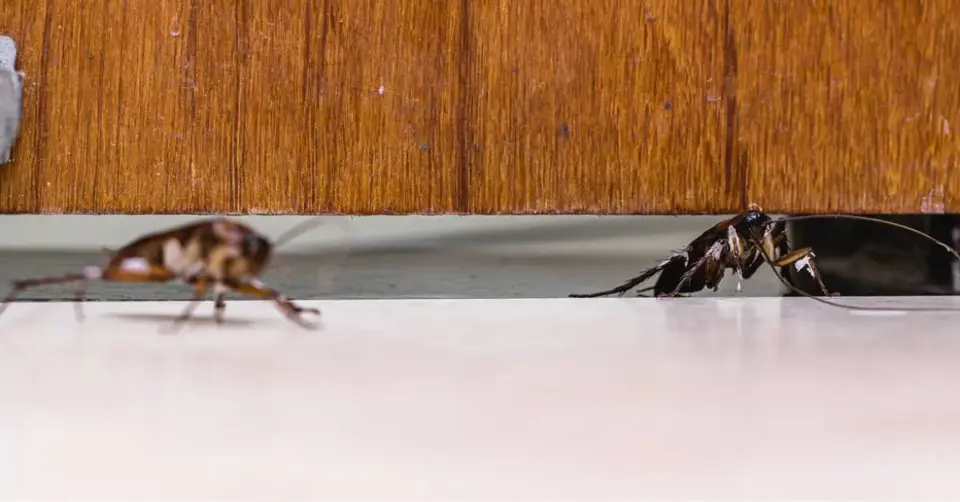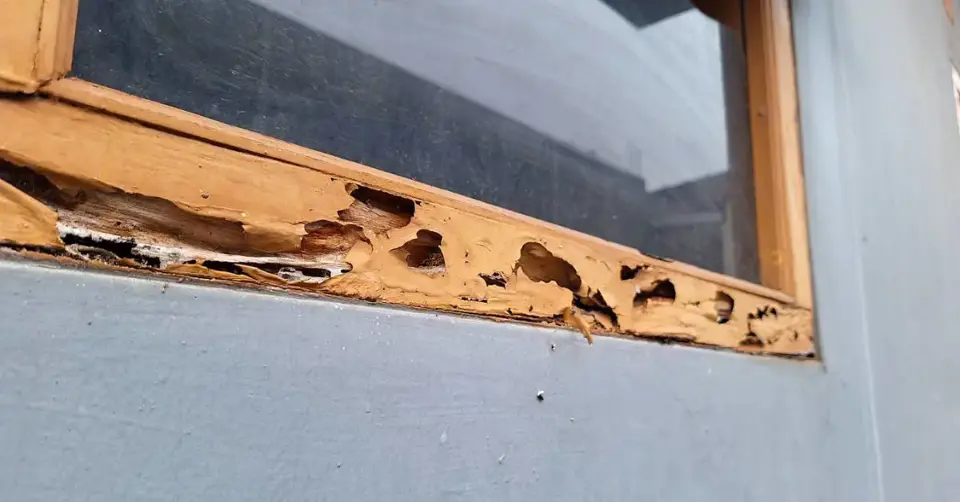

Katy Stinging Insect Control
We live in a beautiful area with the MKT Railroad Museum, Paul D Rushing Park, Typhoon Water Park, Mason Creek Park, and great shopping and entertainment venues. In Katy, opportunities abound to enjoy a relaxing hike in a local park or play in the water on a warm Texas day. Our area has many enjoyable attractions and outdoor activities, but Katy residents must remain vigilant against stinging insects.
Although most animals and insects avoid human contact, mosquitoes, fleas, ticks, and stinging insects in Texas don't hesitate to interact with humans. For example, female mosquitoes bite people to enable egg production; ticks, fleas, and bed bugs draw blood from humans for survival, but stinging insects do not need our blood; instead, these insects pierce our skin to inflict pain.
It is not a question of "if" you will experience stinging insects on your Katy property but "when" they will invade your safe space. If pain-inflicting insects chase you when mowing the lawn or attack while you relish an outdoor meal on the patio, secure the Katy pest control team from All-Safe Pest & Termite so you can be safe and enjoy the outdoors.
Our forty-plus years of confronting stinging pests in Katy have taught us that these pests are a real problem requiring special attention not only in the spring and summer but throughout the year. People often do not concern themselves with these pain-inflicting insects until the spring or summer; however, to prevent a miserable summer, you need to take action throughout the year against these pests. The following information will help you identify stinging insects in Katy, why they are dangerous, and what you can do about them.
Types Of Stinging Insects That Build Nests In Katy
When we think of stinging insects, we have images of flying insects that sting: bees, wasps, and hornets, but pests that sting can include crawling creatures too. Let's begin our identification of stinging insects by examining crawling insects in Katy that inflict pain on local area residents.
Although many people think that discomfort inflicted by a fire ant is from a bite, the misery produced is really from a sting. Imported red fire ants bite to hold onto their victim while they sting and inject venom; the red, painful white blisters from fire ant stings are from its abdominal stinger and not bites. A fire ant can sting multiple times in response to a perceived threat, and the stings cause painful, itchy, and irritating blisters which take several days or weeks to heal.
Another ground-dwelling stinging animal is the scorpion. The scorpions in Texas are unusual-looking spider-related creatures that do not deliver a lethal sting but inflict pain. When working around rocks, landscaping timbers, paving stones, and logs in the yard, be careful because they are hideouts for scorpions.
Moving from the ground to the air, the types of stinging insects we encounter are bees, wasps, and hornets. Bumble bees, carpenter bees, mason bees, squash bees, leafcutter bees, and sweat bees are in our area, and if you threaten their nests, they will sting.
There are two categories of bees, social and solitary. Social bees, like bumble bees, create large nests above ground in attic soffits, near patios and decks, and in trees and bushes, while carpenter bees infest softened wood. Male bees do not sting, but only females have stingers, which are part of their reproductive system. A common myth is that bees die when they sting, but only honey bees have barbed stingers; their stingers become stuck in the skin of victims and cause death to the bee when it tries to leave. The good news is that bees are docile insects that sting only when threatened.
Wasps are similar to bees in that there are social and solitary wasps. Social wasps living in colonies include yellow jackets, hornets, and paper wasps; solitary wasps do not build large, communal nests.
Yellow jackets and hornets are part of the wasp family that are more aggressive in the late summer and early fall when their nests become crowded. Yellow jackets build nests inside walls or the ground where they can accidentally be disturbed when walking in the yard or working in the house. Yellow jacket wasps sting multiple times due to their smooth stingers.
Hornets are a subset of wasps that build their large, grey, paper-like nests above ground in sheds, hollow trees, and chimneys. Despite their size and loud buzzing, hornets are docile but will deliver a powerful, painful sting if provoked.
Whether your property has flying insects that sting or insects crawling on the ground that inflict pain, you need the stinging insect control services of All-Safe Pest & Termite.
Why Stinging Insects In The Yard Can Be A Problem
Stinging insects are responsible for nearly 500,000 visits to the emergency room each year; these are some of the many issues stinging insects in Katy can cause:
- Allergic reactions: Some people experience anaphylaxis, a potentially life-threatening reaction that causes the susceptible individual to go into distress because their immune system releases a flood of chemicals into their body in response to the venom. There may be difficulty breathing due to narrowing airways, decreasing blood pressure, and nausea and vomiting are all symptoms of anaphylaxis requiring immediate medical attention.
- Structural damage: Carpenter bees cause damage by boring six to twelve inches into weathered and decaying wood, which may be in your crawl space, attic, or the home's exterior. The wood-destroying bee species reuse their nests each year and return to restart excavation where the old nest ended, and as a result, the reused nest goes even deeper into the wood. When the carpenter bees finally abandon their nests, wood-decaying fungi and carpenter ants move in and continue the destruction. As carpenter bees and ants compromise the structural integrity of your Katy home, floors begin to sag, door and window frames warp, and structures start to collapse.
- Environmental damage: While hornets kill insects that damage your garden or plants, they also kill "good" insects such as bees.
- Personal fear: The presence of stinging insects on your Katy property keeps you and your family from enjoying summer days in your yard and garden; friends and family should not live in fear of stinging insects when walking barefoot in the grass, trimming bushes, mowing the lawn, or enjoying an outdoor cookout.
Our highly-trained technicians from All-Safe Pest & Termite ensure that our customers enjoy their time outdoors without fearing stinging insects.
What Attracts Stinging Insects To Build A Nest On Your Property
Food, water, and shelter attract stinging insects to your Katy home. Pain-inflicting insects, like carpenter ants, find refuge in old rotting trees, and moisture-ridden wood inside and outside your home attracts carpenter bees. Paving stones, landscaping timbers, and logs attract scorpions and fire ants. Overgrown shrubs, dense vegetation, tall grass, and poorly drained, shaded, moist areas attract yellow jackets and other ground-dwelling stinging insects looking for nesting locations.
An abundance of flowers, fruit trees, and berry plants attract honey bees. Protein-rich and sweet food in uncovered garbage containers, compost piles, and outdoor cookouts lure wasps, yellow jackets, hornets, and bees searching for food. Crumbs left from outdoor eating events attract fire ants.
Poorly drained properties with standing water or moist, low-lying areas attract many types of insects, which attract stinging insects. For example, wasps eat ants, bees, beetles, flies, crickets, carrion, and caterpillars. Spiders eat insects, and where insects are abundant, you will find spiders, which scorpions like to eat. Scorpions also consume rodents and other small mammals, which are also attracted to moist, shaded areas with debris. Technicians at All-Safe Pest & Termite work with Katy homeowners to identify and remove stinging insect attractions to their property.
What's The Best Way To Keep Stinging Insects Away From The Yard?
Steps you can take to minimize stinging insects on your property are:
- Paint exposed wood surfaces with oil-based or polyurethane paints to discourage carpenter bees from infesting the areas.
- Remove dead trees, leaf piles, excess stones, logs, and other debris from the yard.
- Cover any outdoor garbage containers and compost piles.
- Trim shrubs and trees to allow for airflow and to reduce high-moisture areas.
- Clean the area after outdoor cookouts.
- Provide proper drainage to the property.
For your safety and those around you, do not remove nests!
Contacting our team at All-Safe Pest & Termite is the best way to remove this long list of stinging insects in Katy. When you schedule an inspection, one of our certified, experienced technicians will thoroughly examine your location to determine nesting locations, attractants, and the stinging pest culprit.
After a consultation informing you of the issues and the treatment process, our technician will carefully remove stinging insect nests from your property. They will treat roof overhangs and possible future nesting areas to create a barrier around the home with safe products to deter future infestations. When you purchase a reoccurring plan, we will conduct regular return visits to maintain the protective borders around the house to prevent future infestations.
Our time-tested process, which we have developed over 40 years of pest control, effectively resolves the pest problem at your Katy home. Contact us today and get a free estimate.

-
 Starting at $4999/mo*Terms and Conditions apply. 'Learn More' for details.
Starting at $4999/mo*Terms and Conditions apply. 'Learn More' for details.- Home Pest Control
- All-Safe Service Guarantee
- Home Interior Warranty
- Exterior Fire Ant Control
- Exterior Spider Web Removal
- Exterior Rodent Baiting
- Pest Prevention Service
- Termite Colony Elimination System
- Termite Baiting
- Termite Service Warranty
-
 Starting at $6999/mo*Terms and Conditions apply. 'Learn More' for details.
Starting at $6999/mo*Terms and Conditions apply. 'Learn More' for details.- Home Pest Control
- All-Safe Service Guarantee
- Home Interior Warranty
- Exterior Fire Ant Control
- Exterior Spider Web Removal
- Exterior Rodent Baiting
- Pest Prevention Service
- Termite Colony Elimination System
- Termite Baiting
- Termite Service Warranty

How Can All-Safe Pest & Termite Help?
-
 Residential Pest Control Safeguard your home and yard from invading pests with the Pest365 and UltraPlus plans from All-Safe Pest & Termite.Learn More
Residential Pest Control Safeguard your home and yard from invading pests with the Pest365 and UltraPlus plans from All-Safe Pest & Termite.Learn More -
 Commercial Pest Control Serving a wide variety of businesses and industries, we'll customize a treatment plan tailored to your facility's specific needs.Learn More
Commercial Pest Control Serving a wide variety of businesses and industries, we'll customize a treatment plan tailored to your facility's specific needs.Learn More -
 Termite Control Termites cause over $5 billion in property damage in the U.S. every year. Avoid termite damage with our termite control plans.Learn More
Termite Control Termites cause over $5 billion in property damage in the U.S. every year. Avoid termite damage with our termite control plans.Learn More -
 Mosquito Control Don't let mosquitoes keep you inside! Get mosquito control from All-Safe, offered as both a one-time service or seasonal plan.Learn More
Mosquito Control Don't let mosquitoes keep you inside! Get mosquito control from All-Safe, offered as both a one-time service or seasonal plan.Learn More -
 Rodent Control Nobody wants rodents in their home! Get rid of mice and rats with rodent control and removal from All-Safe Pest & Termite.Learn More
Rodent Control Nobody wants rodents in their home! Get rid of mice and rats with rodent control and removal from All-Safe Pest & Termite.Learn More -
 Pest Guide Looking to learn more about the pests in your area? Visit our guide for more information on Texas insects, rodents, and wildlife.Learn More
Pest Guide Looking to learn more about the pests in your area? Visit our guide for more information on Texas insects, rodents, and wildlife.Learn More




.jpg.2601291047352.webp)
